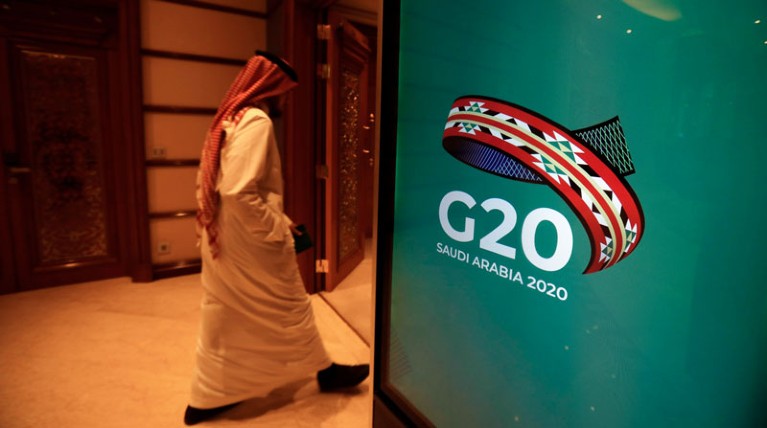
International collaboration will be on the agenda as leaders of the G20 nations meet in Riyadh in November.Credit: Yahya Arhab/EPA-EFE/Shutterstock
One by one, doors to international collaboration in research are starting to close.
The US government is leaving the World Health Organization and continuing its crackdown on scientists with connections to China. China’s government, meanwhile, is ending a policy that actively encouraged researchers to publish with colleagues in other countries.
In the European Union, some leaders have been suggesting that the flagship Horizon Europe research-funding programme should put more conditions on international participation — a dismaying development for an institution founded to strengthen bonds and protect against conflict.
At the beginning of this month, the European Commission published a foresight study aimed, in part, at achieving what it is calling ‘technological sovereignty’, a phrase that would have been unthinkable even a year ago.
The report finds that the EU has become overly reliant on other countries, especially China, for supplies of crucial raw materials — including graphite, cobalt and lithium — that are needed in batteries and fuel cells, as well as in solar and wind-energy technologies. As fossil-fuel use declines, the EU will need nearly 60 times as much lithium by 2050 as it does today, according to one scenario. It will be looking for ways to bring mining of these materials — and the manufacturing processes they are involved in — closer to home. All of this suggests that the curtain is about to fall on an era of expanding international collaboration in research and technology.
But one group of researchers is sensibly keeping lines of communication open. On 26 September, Saudi Arabia will host the S20 — a meeting of scientists in advance of the G20, the annual gathering of heads of government of the world’s 20 biggest economies, due to take place in Riyadh in November.
With science in the spotlight and with research being essential to ending the global coronavirus crisis, the S20 has been conducting a foresight exercise for global benefit. The aim is to assess how all countries could become more resilient to external shocks, such as pandemics, and how they can prepare for the transition to sustainable development. The S20 canvassed expert and lay opinions from around the world, surveyed academic literature and held evidence sessions to discuss what they found.
The final results are due to be published in time for the 26 September meeting, but an interim paper seen by Nature makes its timely message clear. The world is now more interconnected than at any time in human history, which means international research collaboration must be central to any ambition to understand how to make societies more resilient.
It’s the right message. Societies that seek to erect barriers — for example, by restricting the flow of ideas — will find it tougher to withstand sudden shocks than will those that are open to sharing what they know, from genome sequences and clinical-trial results to designs for personal protective equipment and source code for contact-tracing apps.
The question is whether the intended audience of politicians and policymakers is ready to listen. Right now, it is hard to see the leaders of the G20 nations pivoting to adopt a more collegial approach to dealing with the pandemic. Too often, it’s every country for itself. Take vaccine purchasing as an example. G20 governments, led by the United States, the United Kingdom and the EU, have pre-ordered more than two billion doses. The United Kingdom has purchased 340 million doses — 5 for each citizen — which will leave limited supplies for low- and middle-income countries.
Often, when researchers are involved in providing advice to policymakers — as in the current pandemic — it is deemed necessary for them to step back from decisions based on that advice, on the grounds that research stops where politics and policy begin. But there are exceptions: when countries unilaterally put up barriers to collaboration, researchers cannot remain silent.
That makes the key message of this year’s S20 meeting more important than ever: the shifting sands of geopolitics must not affect the relationships that power research.

 Researchers: show world leaders how to behave in a crisis
Researchers: show world leaders how to behave in a crisis
 The unequal scramble for coronavirus vaccines — by the numbers
The unequal scramble for coronavirus vaccines — by the numbers
 US political crackdown spurs fears of Chinese brain-drain
US political crackdown spurs fears of Chinese brain-drain
 China’s research evaluation revamp should not mean fewer international collaborations
China’s research evaluation revamp should not mean fewer international collaborations







